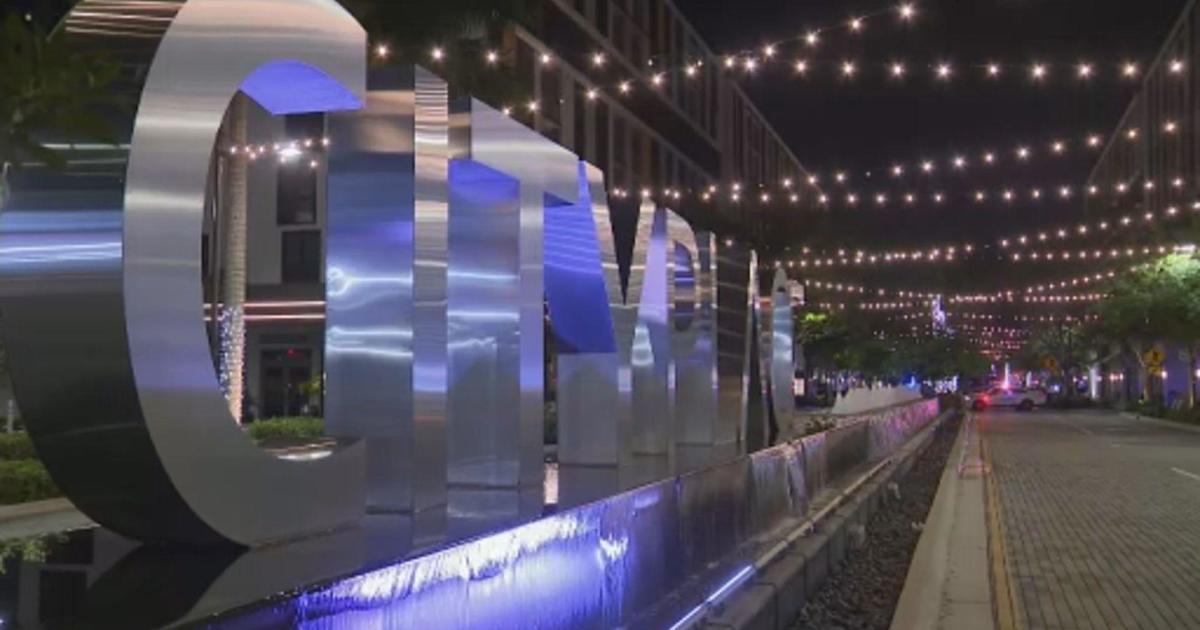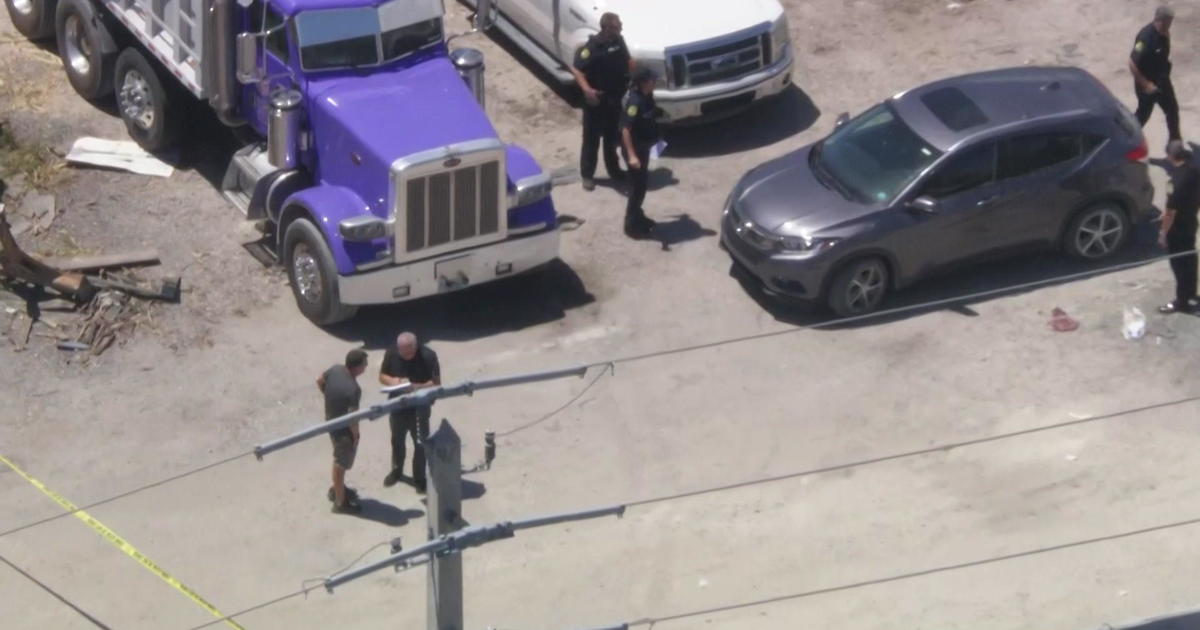Are Some Cities Setting Drivers Up To Lose With Red Light Cameras?
MIAMI (CBSMiami) - Earlier this year in a CBS4 investigation, we showed you how drivers are beating red light camera tickets, while others are being taken for a ride. In this report, CBS4's David Sutta continues his investigation on how cities may be setting you up to lose in what some are calling kangaroo courts. It's a story that may leave you wondering…is this legal?
It's a Tuesday night in West Miami. Inside City Hall roughly a dozen people are sitting waiting for their name to be called. One after another, they step up to the podium.
"Guilty. $158 fine. Administrative cost of $100," the "judge" orders. The driver hangs their head and walks away defeated.
The next name is called. The driver steps forward. The video rolls on a screen, showing them rolling through a red light. The driver looks back at the judge hoping for mercy.
"What do you have to say?" he asks. The driver says nothing, just a head nod. "All right I adjudicate you guilty. A fine of $158 dollars. Administrative cost of $100." Like the hundreds before, the driver takes the judgment and walks out.
Outside, we tell the driver they've been taken but they don't seem to care. They've already accepted the $258 fine. They don't want to hear they shouldn't have paid it.
By appearance Ramon Irizarri seems like a judge. Inside West Miami City Hall he rules on red light camera hearings decisively, usually in a matter of seconds. Appearances can be deceiving though. Irizarri is not a judge. He's an attorney hired by the city to comply with the law; affording you a chance to appeal your red light camera violation. And we found he rarely rules in a driver's favor. In fact, on the day we observed no one won.
YOUR OPTIONS:
When you get a red light camera ticket you have three choices:
• You can pay it, which most people do.
• You can fight it with the city who issued the ticket at a city hearing.
• You can fight it at county traffic court, which most people don't even know about.
The last option isn't even an option until you fail to pay the notice of violation in 60 days. By not paying it becomes a uniform traffic citation, essentially increasing the penalties, fines, and fees associated with it. In a CBS4 investigation though we found taking it to county court is often worth it.
PAYING THE "JUDGE"
When questioned about the law and the hearings, Irizarri didn't want to talk about it with CBS4. West Miami's City Manager Yolanda Aguilar did agree to sit down and speak on the matter though. "It's like a court hearing." Aguilar explained. "But who's the magistrate?" CBS4's David Sutta asked. Aguilar replied "We have two attorneys who have experience in this field." Who pays for them to be here? "The city does," she said. And how much are they paid? Aguilar replied "They are paid $125 an hour." Sutta asked "Do you see a conflict there at all?" She thought about it for a few seconds. "Not necessarily. I think they are fair."
A hearing at City Hall, with city police officers acting as prosecutors and a quote judge who's paid by the city, a lot of people don't think it's fair—at all.
Miami Representative Frank Artiles finds it disturbing. He reasoned, "If a judge was to dismiss 50-percent of the cases, I guarantee that judge is not going to be there next month."
Judge Steven Leifman, a real judge with the Eleventh Judicial Circuit of Florida called it "troubling." Judge Leifman oversees the traffic division at the Miami-Dade courthouse. His hearing officers preside over thousands of red light camera hearings. He attended city run hearings like the one we attended and found it eye-opening.
"I actually sat in the back. No one knew who I was. And it was very disconcerting. There was not a sense of a justice at some of these. People seemed to be getting railroaded. Their issues weren't being heard," Leifman said. Artiles has a name for the hearings—Kangaroo courts.
"Unfortunately what we have here is kangaroo courts setup by the commission, and second of all we have people that are coming in there that think they are having appeals. In reality they are being setup for failure," Artiles said.
Artilles says these kangaroo courts can be found all over South Florida. From Aventura to Homestead, thousands of appeals are taking place where the driver never stands a chance. It might be fine if you were breaking the law..but what if you weren't? What if those cities were the ones breaking the law? That very well may be happening with red light cameras and turning right.
CONFUSED "JUDGES"
In West Miami we saw firsthand the hearing officer didn't even know the law. Irizarri explained to the drivers at the start of the hearing the law as he saw it.
"The law changed on July 1, 2013. Now you are required to come to a complete stop at the stop bar," Irizarri said.
In other words, he just said you must stop when turning right, before the painted line on the ground. He's dead wrong. Leifman shook his head upon hearing the interpretation.
"It's very clear under the law that you do not have to make a complete stop at a red light camera so long as you are careful and prudent." Leifman said.
Two very different interpretations of the law; one from a judge, another from one pretending to be a judge.
CBS4's David Sutta asked Judge Leifman "Silly question but who's right?" Leifman chuckled "Well I think that we have a lot of years of experience."
Here is the actual Florida statute:
"316.0083 Mark Wandall Traffic Safety Act: A notice of violation and a traffic citation may not be issued for failure to stop at a red light if the driver is making a right-hand turn in a careful and prudent manner at an intersection where right-hand turns are permissible. A notice of violation and a traffic citation may not be issued under this section if the driver of the vehicle came to a complete stop after crossing the stop line and before turning right if permissible at a red light, but failed to stop before crossing over the stop line or other point at which a stop is required."
Nowhere does it say you must stop for a red light camera when turning right. In fact it explicitly says you can't get a ticket if you stop past the stop bar. We took this to West Miami's City Manager. She replied via email explaining they automatically throw out tickets if the driver stops anywhere when turning right. She wrote in an "Abundance of caution" though she would speak to magistrate Irizarri to explain to him the law. It was a surprising response. The magistrate overseeing the hearing was now not just being paid by one of the interested parties to oversee the hearing against you, they were now being told how to interpret the law and rule on it.
HOMESTEAD'S MAYOR ADMITS "It's a tax."
While West Miami wholly believes their hearings are fair, at least one city is admitting they are not…Homestead.
We exposed in a previous report red light camera tickets being issued for people turning at one mile an hour. Homestead Mayor Jeff Porter is angry over it. "I'm looking at fairness. A right hand turn at one mile an hour is not fair for a $158 ticket." he told Sutta.
Porter caught our report and thinks people should open their eyes.
"It's a tax. It comes out of nowhere and I just don't understand the whole concept of actually interpreting the ruling," Porter said. By interpreting, or, as some say, exploiting the law to say you must stop, it is actually quite lucrative.
The city of Aventura collected $1.7 million dollars in tickets last year, 53-percent came from questionable right hand turns. In Homestead, 35-percent of red light tickets are for right on red. It's worth a little over $300,000. Mayor Porter doesn't deny it—it's all about money.
"There is no other justification, especially for the right hand turn. There may be a question of safety running a red light. I just don't see the value in the right hand turn," Porter said.
He'd like to see his city's lucrative right on red policy gone.
"If there is a lack of clarity, the way I would clarify it is eliminate it," he argues. The Mayor recently attempted to bring the issue up with his city, only to see he didn't have enough support. Minutes taken from a council meeting show Vice Mayor Stephen Shelley was in support of removing the cameras altogether. Councilman Elvis Maldonado cited an incident he had years ago where he almost hit a woman with a baby crossing the street. He believes the cameras add safety. It should be noted the National Highway Traffic Safety Administration (NHTSA) found that accidents with regard to right turns on red lights are extremely rare. Just four of all accidents they studied involved a right hand turn on red. Half that (.2-percent) were fatal accidents involving a pedestrian and bicyclist.
(Read that report by clicking here)
Numerous studies have found the overwhelming majority of red light accidents involve cars going through an intersection or rear end crashes when a driver stops quickly.
Another councilman was more concerned with the profits and costs of the program. When first pitched the projections for profits were much greater than what they have actually produced. With the state of Florida taking more than 50-percent of the fines, those profits disappeared. There appeared to be a bit of resentment among some politicians over that.
Councilman Jon Burgess did mention the CBS4 report on drivers being ticketed for two-three mile an hour turns.
"If we're guilty of two-three mile an hour tickets we need to address it," he said. The police department assured the council they issue tickets for drivers turning at 15 miles an hour or more. What the department failed to mention is that miles per hour reading happens a good distance away from the intersection. That means the driver may be approaching the intersection going 15 mph or more and the camera will be triggered to capture a violation. The actual turn though, can be considerably slower. In fact the cameras often capture violations where the driver actually stops, yet the camera clocked them doing 15 to 20mph.
In Homestead, the red light camera officer reviewing the violations likely discards hundreds, if not thousands of those violations.
Homestead's Mayor shrugs, "I am only one person. If I were king maybe things could be different."
After the discussion with the council he realized he didn't have majority support and he let it go. He's hoping to bring it back again though.
"Hopefully what you have done through this (investigation) is elevate the discussion." he said.
He's up against a lot of money though. Representative Artiles recently lost his effort to eliminate the cameras or at least reduce the ticket prices in the Florida legislature. Lobbyists representing just about every city with red light cameras demanded the cameras stay on and nothing change.
"This is a revenue generator. Make no mistake about it. And if this was about safety than they would support my bill." Artiles said.
HIRED BY CITY, FIRED BY COUNTY
Back at the county courthouse Judge Leifman recently had openings for red light camera hearing officers. He says he trashed dozens of city magistrate resumes.
"I think we hired two," Leifman said. "Because the two we felt were fair and neutral in the municipalities." The rest didn't meet that bar.
Yet in cities across South Florida they continue to rule, reaping hundreds of thousands of dollars for cities that may be exploiting the law. Aguilar, West Miami's City Manager, argues they are well within the law.
"I have complete confidence that the chief is following the law, and if there is a loophole in the law, it's up to lawmakers to redefine those boundaries."
RELATED CONTENT:



